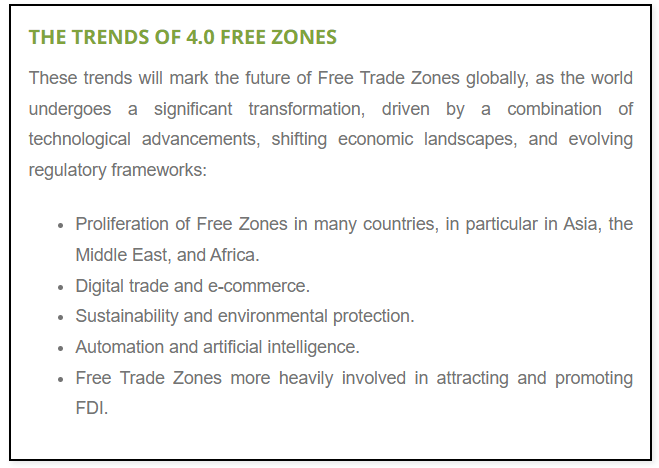Explore How Coyol Free Zone Embraces Nearshoring, Sustainability, and Technology for a Competitive Advantage in Free Trade Zones
February, 2025. In recent years, as the world becomes more interconnected, the trend towards Free Trade Zones (FTZs) has been accelerating, with countries recognizing the benefits of reducing trade barriers and fostering greater economic cooperation.
Global trade is undergoing a significant transformation, driven by a combination of technological advancements, shifting economic landscapes, and evolving regulatory frameworks. Free Trade Zones are at the heart of this transformation, playing a critical role in facilitating international trade, by providing businesses with a favorable environment for developing new products and research, manufacturing, warehousing, and distribution.
As we look forward to the future, some key trends are set to drive the evolution and operation of Free Trade Zones, unlocking new opportunities for companies to innovate, expand, and thrive in a dynamic global landscape.
Growth of Free Trade Zones
One of the key trends shaping the future of global trade is the rapid growth of Free Trade Zones worldwide. New industrial parks are attracting billions of dollars in foreign direct investment, particularly in Asia, the Middle East, and Africa. In recent years, the United Arab Emirates has emerged as one of the largest hubs for trade and logistics globally.
Free Trade Zones (FTZs) in Latin America are experiencing unprecedented growth, largely driven by the nearshoring of operations by U.S. companies due to Covid-19’s disruption of global supply chains. The value proposition of Costa Rica, particularly the Coyol Free Zone, is highly attractive to U.S.-based firms, especially considering that the two countries are commercial allies.
Additionally, Coyol Free Zone is considered the best Free Zone in the Americas by fDi Intelligence, and its strategic position bolsters the benefits of Nearshoring with advantages such as closeness to the main airports and seaports of Costa Rica, talent and recruitment services, tailor-made buildings, and cutting-edge infrastructure, among others.
Digital trade and e-commerce
Another trend influencing the future of global trade is the growth of digital trade and e-commerce. This development has opened new avenues for businesses to market their products and services internationally, resulting in a significant increase in cross-border e-commerce.
Free Trade Zones are well-positioned to capitalize on this trend, as they offer companies a range of benefits, such as streamlined customs procedures and access to advanced logistics infrastructure.
Sustainability and green practices
The increasing significance of sustainability and environmental protection is influencing the future of global trade. As concerns about climate change and environmental degradation rise, consumers are demanding products that are produced sustainably and with environmental considerations in mind.
Free Trade Zones that prioritize sustainability and green practices are likely to attract more businesses and investors in the future. By promoting renewable energy, reducing waste, and implementing strict environmental regulations, Free Trade Zones can help companies meet the demands of eco-conscious consumers and contribute to a more sustainable global economy.
Automation and artificial intelligence
The rise of automation and artificial intelligence is another trend that is impacting the future of global trade. As technology advances, businesses are increasingly turning to automation and AI to streamline their operations, reduce costs, and improve efficiency.
Free Trade Zones that invest in advanced technology and infrastructure are in a strong position to serve businesses seeking to leverage automation and AI to boost their competitiveness. By providing access to cutting-edge technologies, these Free Trade Zones can drive innovation and accelerate economic growth.
The disruption of global supply chains due to the Covid-19 pandemic has made Free Trade Zones increasingly important for promoting trade and investment.
Coyol Free Zone serves as an excellent example of how Free Trade Zones can assist businesses in overcoming challenges, such as those presented by the pandemic, and contribute to a swift economic recovery.
How is Coyol Free Zone adapting to the future of Free Trade Zones?
The future of Coyol Free Zone is bright, as it continues to play a key role in driving economic growth in Costa Rica. Our Park is constantly evolving to meet the needs of businesses and consumers; and be a benchmark for other Free Zones in the Americas.
By embracing sustainability, promoting innovation, and leveraging advanced technologies, we help our business partners thrive in an increasingly competitive global marketplace.
Our value proposition is guided by sustainable development, aiming for the highest possible economic impact for our clients while preserving our natural ecosystem and promoting the creation of opportunities for our communities.
We host leading companies in their fields, emphasizing digitalization, sustainability, talent, networking opportunities, and fostering local value chains.
Many of those companies are capitalizing on technological disruptions that will set the standard for the future, such as Artificial Intelligence (AI), VR/AR (Virtual & Augmented Reality), robotics, quantum tech, and cybersecurity.
Coyol Free Zone hosts a unique cluster for the Life Sciences industry, where OEMs, suppliers, and contractors can find local solutions and new market opportunities, as well as share expertise.


